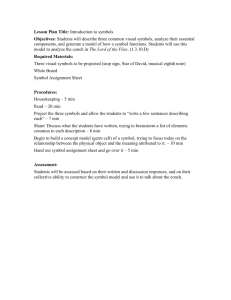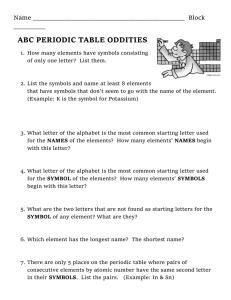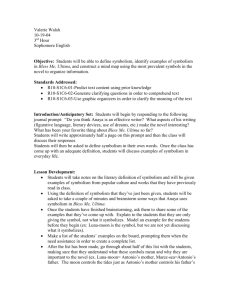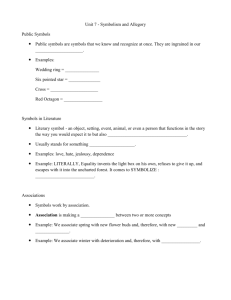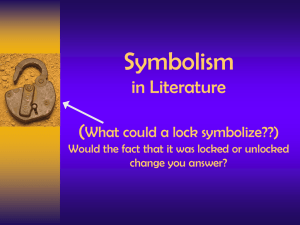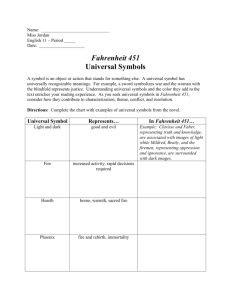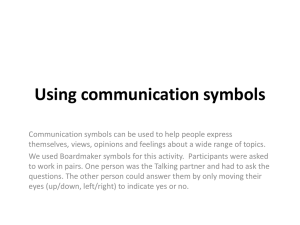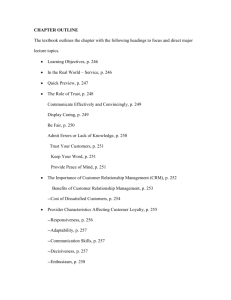Microsoft Word Lesson Plan
advertisement
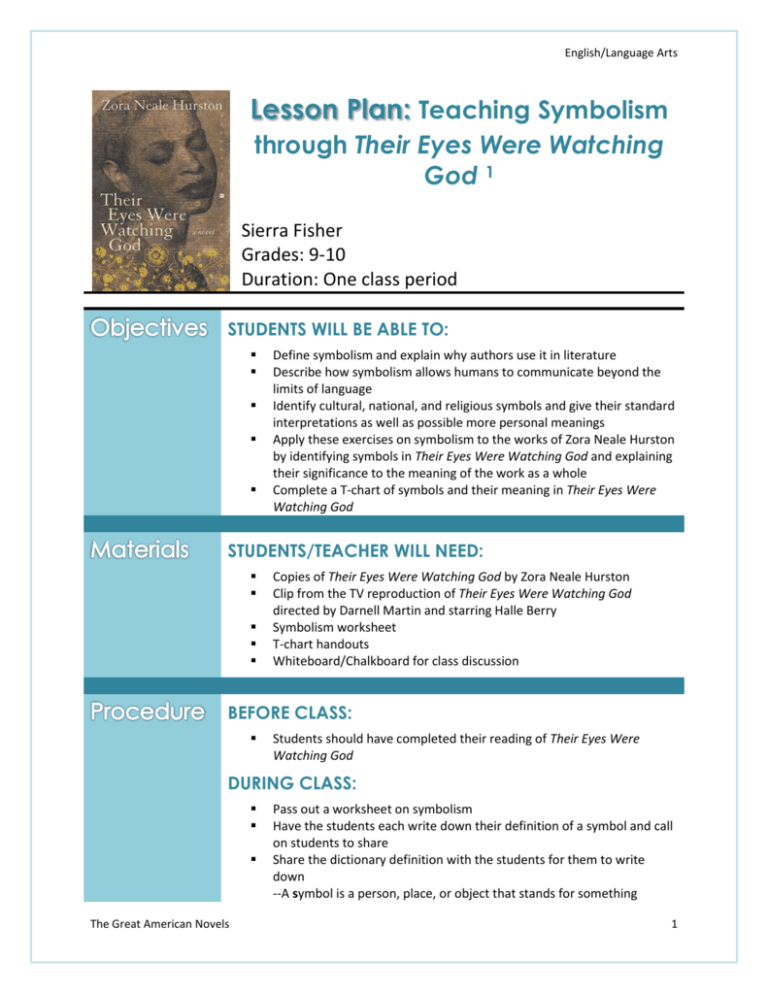
English/Language Arts Lesson Plan: Teaching Symbolism through Their Eyes Were Watching God 1 Sierra Fisher Grades: 9-10 Duration: One class period STUDENTS WILL BE ABLE TO: Define symbolism and explain why authors use it in literature Describe how symbolism allows humans to communicate beyond the limits of language Identify cultural, national, and religious symbols and give their standard interpretations as well as possible more personal meanings Apply these exercises on symbolism to the works of Zora Neale Hurston by identifying symbols in Their Eyes Were Watching God and explaining their significance to the meaning of the work as a whole Complete a T-chart of symbols and their meaning in Their Eyes Were Watching God STUDENTS/TEACHER WILL NEED: Copies of Their Eyes Were Watching God by Zora Neale Hurston Clip from the TV reproduction of Their Eyes Were Watching God directed by Darnell Martin and starring Halle Berry Symbolism worksheet T-chart handouts Whiteboard/Chalkboard for class discussion BEFORE CLASS: Students should have completed their reading of Their Eyes Were Watching God DURING CLASS: The Great American Novels Pass out a worksheet on symbolism Have the students each write down their definition of a symbol and call on students to share Share the dictionary definition with the students for them to write down --A symbol is a person, place, or object that stands for something 1 English/Language Arts beyond itself Have the students write down examples of national, cultural, and religious symbols (American flag, the Cross, etc.) Call on students to write their examples on the board Of the examples written on the board, have a class discussion about the literal meaning of each symbol, the interpretation of the symbol, and possible more personal meaning of the symbol (e.g. the American flag is a symbol of America, but more than that it represents patriotism and pride, and can hold special significance and memories to specific people). Ask the students to write a paragraph explaining how symbolism allows humans to communicate beyond the limits of language WITH THE NOVEL: Transition into a discussion of the novel by showing a clip from the TV reproduction of Their Eyes Were Watching God Pass out T-charts In the left-hand column of the chart have the students write down a concrete object that they believe is a symbol in the novel. In the righthand column the students should write down what they believe the object symbolizes and what it means to the novel as a whole. Share strategies for identifying possible symbols before they begin: --Pay attention to objects named in the title --Pay attention to objects accompanied by a lengthy description --Pay attention to objects that are often repeated --Pay attention to objects that appear at crucial moments Again have students come to the board to write down their symbols and have a class discussion about the written down symbols literal meaning, symbolic reading, and how they further the work as a whole Turn in charts, symbolism worksheet, and paragraph at the end of class CONTINUATION (HOMEWORK): The Great American Novels Have each student pick one of the symbols they discovered in class Have the students prepare a two page essay, double spaced, 12 point font, Times New Roman to be turned in next class The essay should have an introduction, body, and conclusion The essay will tell which symbol the student chose, when it appears in the novel and in what context (the literal meaning), and will then expand on the symbolic meaning they gave in their T-chart. The essay should conclude by telling what would be different or what you wouldn’t know about the novel/characters if the symbol wasn’t there 2 English/Language Arts STUDENTS WILL BE SUCESSFUL IF: They actively participate in the class discussion, offering up symbols they know and what they believe is their meaning They complete and turn in the three class assignments They give a thorough and logical explanation of how symbols allow humans to communicate They correctly identify symbols in Their Eyes Were Watching God (Janie’s hair, the pear tree, the horizon, the mule, etc.) and give a logical explanation of their meaning They complete and turn in the essay with all the required components and demonstrate that they understand how their chosen symbol contributes to the novel as a whole INDIANA TEACHING STANDARDS: English/Language Arts Standard 9.3.7: Recognize and understand the significance of various literary devices, including figurative language, imagery, and symbolism, and explain their appeal. Standard 9.3.3: Analyze interactions between characters in a literary text and explain the way those interactions affect the plot. Standard 10.3.12: Analyze the way in which a work of literature is related to the themes and issues of its historical period. Standard 10.5.2: Write responses to literature that demonstrate a comprehensive grasp of the significant ideas of literary works, support statements with evidence from the text, demonstrate awareness of the author's style and an appreciation of the effects created, and identify and assess the impact of ambiguities, nuances, and complexities within the text. 1 this lesson was adapted from a lesson found at http://www.brighthub.com/education/k12/articles/28791.aspx The Great American Novels 3
